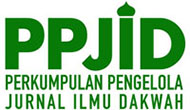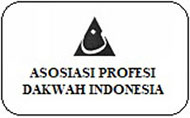Muslimah Participative Dakwah in Handling Domestic Violence in The Covid-19 Period
Abstract
This study investigates the participation in da'wah by female preachers of 'Aisyiah in Bogor Regency to address the significant increase in domestic violence during the Covid-19 period. The lack of comprehension in the application of intersexual communication to solving economic, health, and educational problems for children is the primary factor in the emergence of both verbal and physical violence. Participatory methods to observe and encourage action and collaboration between female preachers of Aisyiah in Bogor Regency and volunteers, as well as in-depth observations and interviews, comprise the study's approach to da'wah and gender communication. Field analysis of data processing analysis. This study demonstrates that husbands committed more domestic violence against their women during the Covid-19 period as a result of deteriorating gender communication patterns due to emotional dominance and a lack of comprehension of Islamic values between partners. Therefore, it is necessary to approach gender communication based on the Qur'an and hadith in order to assist married couples in achieving inner balance.
Keywords
Full Text:
PDFReferences
Bellizzi, S., Nivoli, A., Lorettu, L., Farina, G., Ramses, M., & Ronzoni, A. R. (2020). Violence against Women in Italy during the COVID-19 Pandemic. International Journal of Gynecology & Obstetrics, 150(1), 258–259. https://doi.org/10.1002/IJGO.13270.
Bintari, D. R. (2019). How Muslim Women Empower Themselves Through Active Participation in Islam in Indonesia? Jurnal Psikologi Islam, 6(2).
Denzin, N. K., & Lincoln, Y. S. (2012). The Landscape of Qualitative Research (4th ed.). Sage Publication Inc.
Female Preacher Aisyiah. (2022). An Interview [Personal communication].
Geertz, C. (1985). Religion as a Cultural System. In M. Banton (Ed.), Anthropological Approach to The Study of Religion. Tavistock Publication.
Hamdi, A. (2020). LBH APIK: Women are Vulnerable to COVID-19 Transmission and Violence During the Pandemic. MAMPU.
Harding, S. G. (2004). The Feminist Standpoint Theory Reader: Intellectual and Political Controversies. Psychology Press. https://books.google.com/books/about/The_Feminist_Standpoint_Theory_Reader.html?id=qmSySHvIy5IC.
Hart, J. L., Turnbull, A. E., Oppenheim, I. M., & Courtright, K. R. (2020). Family-Centered Care During the COVID-19 Era. J. Pain Symptom Manage, 60(2), 93–97. https://doi.org/10.1016/j.jpainsymman.2020.04.017.
Hidayah, N. (2020). Covid-19 and Violence Against Women: An Islamic Perspective. Cakrawala: Jurnal Studi Islam, 15(2). https://doi.org/10.31603/CAKRAWALA.3862.
Ivy, D. K., & Backlund, P. (2007). GenderSpeak: Personal Effectiveness in Gender Communication (4th ed.). Pearson.
Kandedes, L. (2020). Kekerasan Terhadap Anak Di Masa Pandemi Covid 19. Jurnal Harkat : Media Komunikasi Gender, 3(1), 66–76. https://doi.org/10.15408/harkat.v16i1.16020
Katsir, I. (2021). Shahih Tafsir Ibnu Katsir: Vol. Jilid 9. Pustaka Ibnu Katsir.
Kong, S.-T. (2014). Participatory Development Of Post-Separation Domestic Violence Services: A Cooperative Grounded Inquiry With Abused Women And Their Teenage Sons/Daughters In Hong Kong [Thesis,]. Department of Social Policy and Social Work University of York.
Kramarae, C. (2005). Muted Group Theory and Communication: Asking Dangerous Questions. Women and Language, 28(2), 55–61.
Kuswanti, A., Muqsith, M. A., Zainal, A. G., & Oktarina, S. (2020). Manajemen Komunikasi Keluarga Saat Pandemi COVID-19. SALAM: Jurnal Sosial Dan Budaya Syar-i, 7(8), 707–722. https://doi.org/10.15408/SJSBS.V7I8.15959.
Mahfudh, M. A. S. (2004). Nuansa Fiqih Sosial. LkiS.
Mahmood, S. (2005). Politics of Piety: The Islamic of Revival and Feminist Subject. Princeton University Press.
Mukhtar, S. (2020). Feminism and Gendered Impact of COVID-19: Perspective of a Counselling Psychologist. Gender, Work & Organization, 27(5), 827–832. https://doi.org/10.1111/GWAO.12482.
Nasor, M. A. A., Jasmadi, M. S., Mulyadi, T. J., Khairullah, R., & Arif, S. (2010). Aplikasi Model Dakwah Partisipatif Dalam Pembinaan Warga Binaan Di Lembaga Pemasyarakatan Wanita Kelas II A Way Huwi Bandar Lampung. In Laporan Penelitian. Fakultas Dakwah IAIN Raden Intan.
Pambayun, E. L. (2013). One Stop Qualitative Research Methodology in Communication. Lentera Cendekia.
Undang-Undang Republik Indonesia Tentang Penghapusan Kekerasan Dalam Rumah Tangga, Pub. L. No. Chapter 1 Nomor 23 (2004).
Peribadi, M. A., & Bauto, O. M. (2022). Konstruksi Perencanaan Partisipatif Berbasis Profetik: Sebuah Tinjauan Teoretis Dan Praktikal. Deepublish Store (Cv. Budi Utama.
Permatasari, A. N., Inten, D. N., Wiliani, W., & Widiyanto, K. N. (2020). Keintiman Komunikasi Keluarga Saat Social Distancing Pandemi Covid-19. Jurnal Obsesi : Jurnal Pendidikan Anak Usia Dini 5, 1, 346–359. https://doi.org/10.31004/OBSESI.V5I1.577.
Radhitya, T. V., Nurwati, N., & Irfan, M. (2020). Dampak Pandemi COVID-19 Terhadap Kekerasan dalam Rumah Tangga. Jurnal Kolaborasi Resolusi Konflik, 2(2), 111–119. https://doi.org/10.24198/JKRK.V2I2.29119
Rakow, L. F., & Wackwitz, L. A. (2004). Feminist Communication Theory: Selections in Context. SAGE.
Rayani, D. (2021). PENTINGNYA PEMBIASAAN KOMUNIKASI POSITIF DALAM KELUARGA DI MASA PANDEMIK COVID 19. Realita : Jurnal Bimbingan Dan Konseling 5, 2. https://doi.org/10.33394/REALITA.V5I2.3414.
Roesch, E., Amin, A., Gupta, J., & García-Moreno, C. (2020). Violence against Women D uring C ovid -19 P andemic Restrictions. BMJ, 1712,. https://doi.org/10.1136/bmj.m1712.
Sharma, A. (2014). Realizing Gender Responsive Governance and Gender Equality Representatives in Democratic Society: A Concrete Situation of Women Empowerment and Participation in Politics. International Journal of Information and Futuristic Research, 2. http://www.ijifr.com/pdfsave/29-09-2014990V2.
Spivak, G. C. (1999). A Critique of Postcolonial Reason: Toward a History of the Vanishing Present. Harvard University Press.
Sugito, M. S., & Hasanah, U. (2016). Pendakwah Perempuan Di Masa Nabi. Cet, 1.
Syam, N. (2010). Model Analisis Teori Sosial. PNM.
Tannen, D. (1990). You Just Don’t Understand: Women and Men in Conversation (Vol. 22). Ballantine Books.
Tannen, D. (2003). Gender and Language Ideologies. In J. Holmes & M. Meyerhoff (Eds.), The Handbook of Language and Gender. Blackwell Publishing Ltd.
Yanti, F. (2012). Dakwah Partisipatif Pada Fenomena Pembangunan. Al-Misbah: Jurnal Dakwah Dan Komunikasi 8, 2.
DOI: http://dx.doi.org/10.24014/jdr.v34i1.19740
Refbacks
- There are currently no refbacks.

This work is licensed under a Creative Commons Attribution-ShareAlike 4.0 International License.
Editorial Office:
2nd Floor, Building of Faculty of Da'wah and Communication, Universitas Islam Negeri Sultan Syarif Kasim Riau. Jl. HR Soebrantas Km 15, Simpangbaru, Tampan, Pekanbaru
Email : jurnalrisalah@uin-suska.ac.id

This work is licensed under a Creative Commons Attribution-ShareAlike 4.0 International License.














